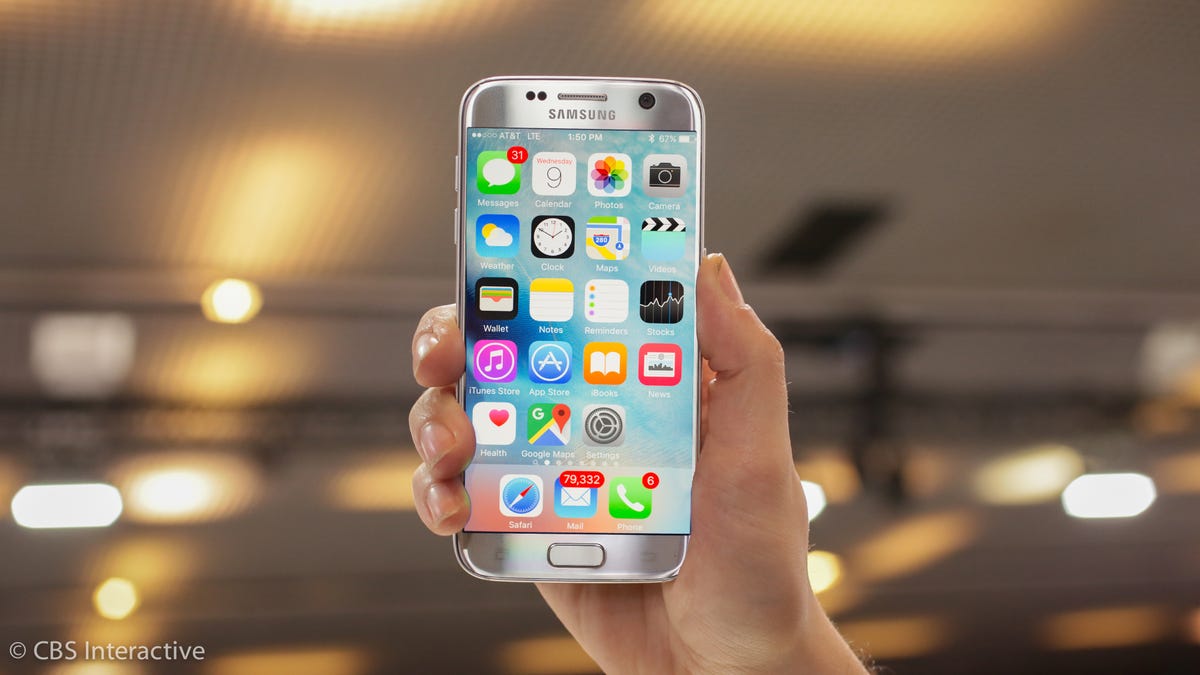For the last several years, I’ve created a wish list of features I’d like to see in the next iPhone. Inevitably, when that new iPhone is unveiled it’s missing about half the “most-wanted” items on the list, leaving them to be carried over to the following year’s iPhone.
It’s hard then not to look at the new Samsung Galaxy S7 and S7 Edge a little wistfully. Simply put they are what the next iPhones should be — at least from a hardware standpoint.
Samsung listened to consumers and critics who lamented the loss of certain standout features like expandable memory and water-resistance in the Galaxy S6. And while the removable battery in the Galaxy S5 didn’t return, higher capacity batteries are now found in both the S7 and S7 Edge. In our early CNET testing, both phones aced our video-loop endurance test.

 Enlarge Image
Enlarge ImageIf only…
Sarah Tew/CNET
The camera has also improved, particularly for low-light shooting, and the built-in wireless charging feature (with an optional wireless charging pad) carries on from the S6. Beyond that, there are other small improvements, and the Samsung Galaxy S7 Edge earned a 5-star rating from CNET, making it our highest rated smartphone.
My only problem with the new Galaxy phones? They run Android.
Not that I don’t like Android. I do. I use a Samsung Galaxy S6 in my day-to-day testing of accessories such as headphones and wireless speakers and bought a Gear VR to get a taste of virtual-reality that’s a step up from using Google Cardboard with my iPhone 6S.
But I prefer iOS. Certainly not all aspects of it. But overall, I like it a little better. Thanks to Apple having tight control over both the hardware and software, the apps have a more consistent look and feel to them and interact more seamlessly, particularly when accessing Apple’s integrated apps such as Photos. Call me superficial, but iOS feels slightly slicker, a little more polished and a bit more intuitive to use.
iPhone 7: Most-wanted features






To find out if your Android phone needs a software upgrade, you have to dig into a menu, look for the “About this phone,” and then check to see if an upgrade is available. And most Android phones get updated at a glacial pace — or never at all. Android Marshmallow (6.0) has been out since October 5, 2015, but the Galaxy S6 hasn’t been updated with it yet (it’s supposed to get an update in mid-March but some carriers may not roll it out for months).
Yet iPhones get updated regularly, and globally: Apple pushes the software update, and tens of millions of phones can upgrade on the same day, regardless of carrier. Even older generation models dating back a few years can run the latest iOS.
We have editors at CNET who’ve written about switching from Android to iOS and back again (Dan Graziano) and vice versa (Dan Ackerman). Just as some people prefer Android (or Windows), I prefer iOS, but it’s not out of any love for Apple. I’m not a fan boy; I just like Apple’s mobile OS better.
Sadly, Apple will never build a Galaxy S7 — or a phone that has its key features. You may see wireless charging and water-resistance come to the iPhone 7, but it won’t have a high-capacity battery or expandable memory because Apple is bent on making the iPhone sleeker and thinner (so, ironically, we can put cases on it) and it makes huge margins on the storage (since we’re all paying an extra $100 to $200 for the 64GB or 128GB models, which cost Apple far less in bulk).
From a business standpoint you can’t argue with the results. Apple’s profit margin per iPhone is around $184 while Samsung’s is around $23, according to Charles Arthur, the former technology editor of The Guardian who’s now a freelance writer. (The only other handset maker that makes a profit is Sony.)
Sure, Apple markets better than anyone. But its iOS software remains a key competitive advantage. After all, it is the only thing keeping me from buying a Galaxy S7.


Now playing:
Watch this:
Samsung Galaxy S7 and S7 Edge: CNET Editors react
2:11



